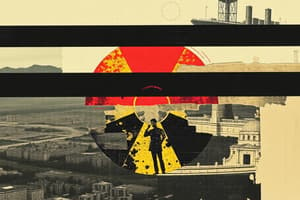Podcast
Questions and Answers
What is the principle behind calculating the age of fossils?
What is the principle behind calculating the age of fossils?
- Analyzing the structure of the fossil
- Examining the surrounding rock formations
- Measuring the size of the fossil
- Studying the decay of isotopes (correct)
What is the primary function of Uranium-235 in nuclear reactors?
What is the primary function of Uranium-235 in nuclear reactors?
- To generate thermal energy (correct)
- To produce gamma rays
- To slow down neutrons
- To create a controlled nuclear fusion
What happens when a slow neutron hits the heavy nucleus of Uranium-235?
What happens when a slow neutron hits the heavy nucleus of Uranium-235?
- It absorbs the neutron
- It splits into smaller nuclei (correct)
- It becomes stable
- It releases gamma rays
What is the expected electricity production capacity of the Rooppur Nuclear Power Plant?
What is the expected electricity production capacity of the Rooppur Nuclear Power Plant?
What is the main danger posed by radioactive isotopes?
What is the main danger posed by radioactive isotopes?
What was the devastating consequence of the Chernobyl accident in 1986?
What was the devastating consequence of the Chernobyl accident in 1986?
What is the primary use of nuclear reactors in power plants?
What is the primary use of nuclear reactors in power plants?
What is the process by which atomic bombs release energy?
What is the process by which atomic bombs release energy?
What is the result of the mass lost in the fission process?
What is the result of the mass lost in the fission process?
What is the primary difference between fission and fusion reactions?
What is the primary difference between fission and fusion reactions?
Which type of nuclear reaction involves the splitting of a large nucleus?
Which type of nuclear reaction involves the splitting of a large nucleus?
What is the equation that relates the energy released to the mass lost in a nuclear reaction?
What is the equation that relates the energy released to the mass lost in a nuclear reaction?
Where does the energy created in the fusion process originate from?
Where does the energy created in the fusion process originate from?
Which type of nuclear reaction is used to create energy in the Ruppur nuclear power plant?
Which type of nuclear reaction is used to create energy in the Ruppur nuclear power plant?
What is the outcome of the fusion process?
What is the outcome of the fusion process?
Where does the fusion process occur naturally?
Where does the fusion process occur naturally?
What is the source of the sun's energy?
What is the source of the sun's energy?
How much energy is produced from burning 1 gram of coal?
How much energy is produced from burning 1 gram of coal?
What is the role of c in Einstein's equation E = mc²?
What is the role of c in Einstein's equation E = mc²?
What is the relationship between mass and energy according to E = mc²?
What is the relationship between mass and energy according to E = mc²?
What is the significance of the equation E = mc² in nuclear power plants?
What is the significance of the equation E = mc² in nuclear power plants?
What is the approximate amount of energy produced from 1 gram of matter through nuclear reactions?
What is the approximate amount of energy produced from 1 gram of matter through nuclear reactions?
What is the location of the country's first nuclear power plant mentioned in the text?
What is the location of the country's first nuclear power plant mentioned in the text?
Why is it difficult to transform mass into energy at will?
Why is it difficult to transform mass into energy at will?
Flashcards are hidden until you start studying
Study Notes
Determining the Age of Fossils
- Scientists determine the age of fossils by studying the decay of isotopes and examining the ratio of stable and unstable isotopes.
Nuclear Power Generation
- Uranium-235 is used as fuel in nuclear reactors to generate electricity in nuclear power plants.
- When a slow neutron hits the heavy nucleus of Uranium-235, it splits into smaller nuclei, producing a significant amount of thermal energy.
- This heat energy is then used to generate electricity with the help of a generator.
Rooppur Nuclear Power Plant
- A new nuclear power plant is being constructed in Rooppur, Bangladesh, which is expected to produce 2,400 megawatts of electricity.
Effects of Radioactive Isotopes
- Radioactive isotopes can be very dangerous to humans in uncontrolled conditions, leading to cancer by causing genetic changes.
- Examples of disasters caused by radioactive isotopes include the atomic bombs dropped on Hiroshima and Nagasaki, and the Chernobyl accident in Russia.
Nuclear Reactions
- There are two types of nuclear reactions: fission and fusion.
- Fission involves a large nucleus splitting into two smaller nuclei, releasing energy as E = mc².
- Fusion involves two small nuclei combining to form a larger nucleus, also releasing energy as E = mc².
Relationship between Mass and Energy
- The source of all energy on earth is the Sun, which radiates energy through nuclear reactions.
- The equation E = mc² shows that a small amount of mass can be converted into a large amount of energy.
- Nuclear energy is much more powerful than chemical energy, with 1 gram of matter producing 9,00,00,00,00,00,000 joules of energy.
Studying That Suits You
Use AI to generate personalized quizzes and flashcards to suit your learning preferences.




